The Dell Chromebook 11 Touch Review
by Brandon Chester on May 7, 2015 8:00 AM EST- Posted in
- Laptops
- Chrome OS
- Chromebook
Web Performance
Due to the limitations of Chrome OS, we're mostly limited to browser benchmarks to characterize performance. It's a similar situation to mobile benchmarking, which I commonly describe as less than optimal. However, since essentially everything a user will do on a Chrome OS device is done through Chrome, it's actually a fairly good indication of the performance they'll see on a given device.
Like the Toshiba Chromebook 2, the Dell Chromebook 11 being reviewed uses Intel's Celeron N2840. Unlike Intel's more expensive Celeron parts which use their Haswell architecture, N2840 uses Silvermont cores much like Intel's Atom parts in the Bay Trail line. Because of this, users should expect performance closer to that of higher end ARM chips and Intel Atom SoCs than that of Intel's Haswell based Celeron parts.
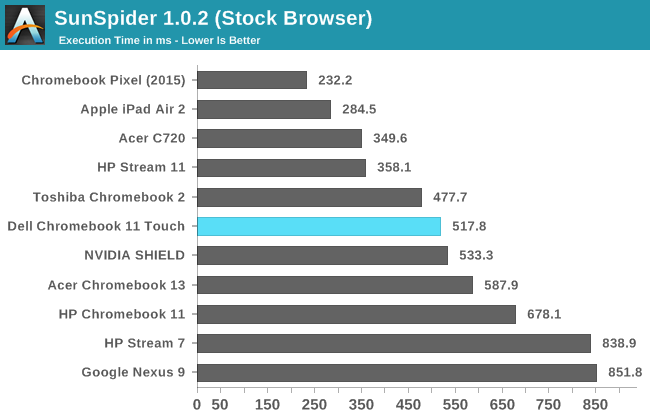
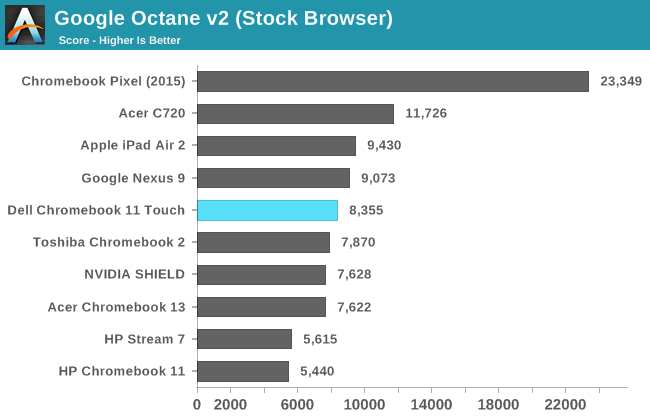
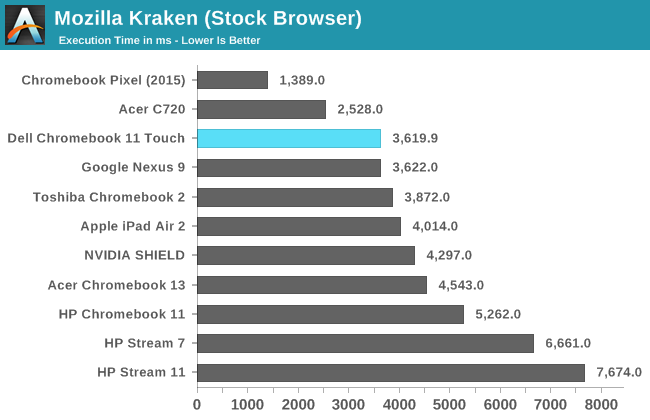
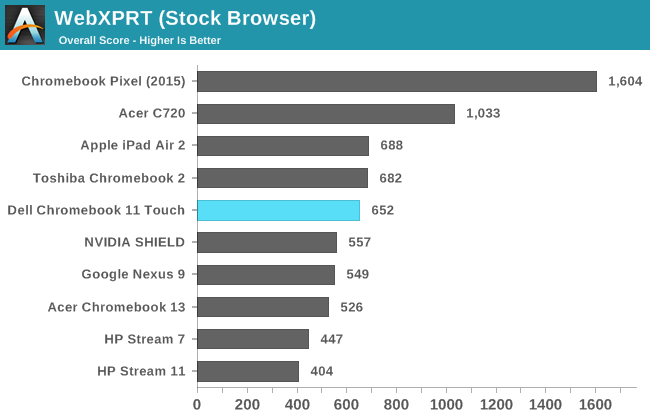
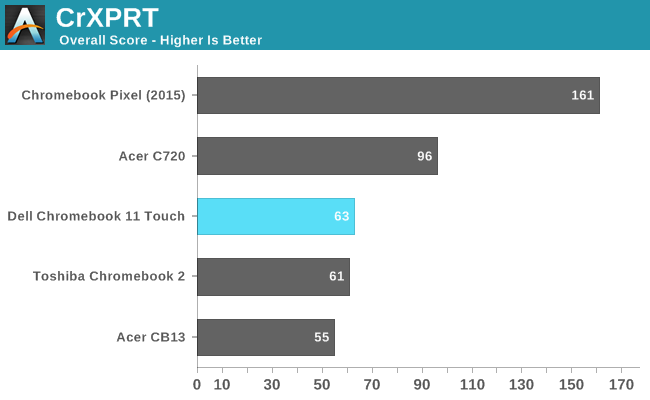
In all of our benchmarks, the Dell Chromebook 11 gets roughly the same results as the Toshiba Chromebook 2. There are some minor differences which can be attributed to variance in scores between tests, as well as updates that have been made to Chrome OS since previous reviews. When using the Dell Chromebook 11 it never seemed to struggle, and I think that users will have all the speed they need to do their work on the web even if the CPU doesn't offer class leading performance.
WiFi Performance
Since Chromebooks are devices that are primarily used to browse the web, it's important to have good WiFi performance. Most inexpensive Chromebooks opt for 802.11n, and sometimes don't even include support for the 5GHz band. Because the Dell Chromebook 11 is more of a mid range Chromebook, it includes support for dual spatial stream 802.11ac which is pretty much as good as it gets for laptop WiFi, with the exception of a few 3x3 devices that are on the market.
While there's no way to test WiFi performance in Chrome OS, it can be accomplished via other means with the use of Linux and iPerf. I'm hoping to eventually bring our laptop WiFi performance test from Windows to Linux in order to get TCP results that are comparable to those in our standard laptop reviews, but for now I've just put the Dell Chromebook 11 through the UDP performance test that we use in mobile reviews.
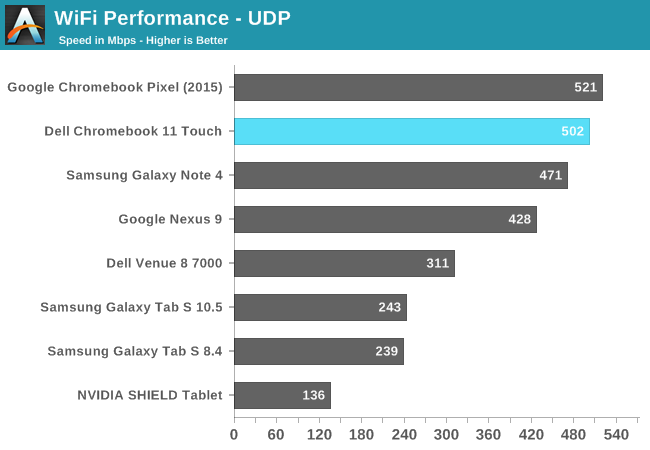
With a maximum speed of 502Mbps, the Dell Chromebook 11 is beaten only by the Chromebook Pixel. I wish I had more Chromebook data points here, but this is a test that I introduced for our Chromebook reviews and this is only my second review of one. Regardless, I don't suspect that users will have any complaints about the WiFi performance on the Dell Chromebook 11.










46 Comments
View All Comments
timgonzales - Friday, May 8, 2015 - link
Agreed. I'd like to see a bump in res and IPS spec become the norm for Chromebooks. As is, the display on the Dell Chromebook 11 is just terrible. At least in the non-touch version anyways.lexluthermiester - Saturday, May 9, 2015 - link
If it were running Android, ok. But ChromeOS? Seriously? Pass...SunnyDog - Sunday, May 10, 2015 - link
I'm very happy with this "ruggedized" Dell Chromebook model for my specific use case, for the price (paid $190 on Amazon for the base model, no touch screen). It's more durable with better build quality than typical Chromebooks in its price range, which is exactly what I was looking for. It's getting lots of use as the go to device for guests and family members, as a safer alternative to trusting them with my MacBook Pro Retina or iPad devices which I'm more cautious with. I often have it close at hand for convenience.In addition, I even use it at client sites for a variety of stuff (or to type up invoices etc.) when I want a keyboard but don't want to lug around my larger heavier more expensive ThinkPad. It's just rugged enough (compared to other Chromebooks). It is not a $3,000 and up ToughBook-class ruggedized laptop (Panasonic or Dell etc.) but at $190 I don't worry about it getting damaged, lost or stolen on the job.
It's targeted at schools. But I find the slightly more rugged design also fits well with my occasional use cases at work and works well around home as a convenient Web connected laptop for friends and family, for the price, despite its specs not being tops in every way.
SunnyDog - Sunday, May 10, 2015 - link
So it fits what I was looking for with kind of a secondary but somewhat ruggedized device with good battery life. The trade off being the display which isn't great but I can tolerate for the way it's being used.val580 - Sunday, May 17, 2015 - link
I think it would be good to post photos comparing displays because I don't understand shit about all these display tests , I think a photo can sometimes make a better point than colors accuracy diagrams etcaj654987 - Monday, May 25, 2015 - link
People also need to be aware that its more than just a TN display problem with these low end chromebooks/netbooks. These are the same low quality screens that have been around since the netbook days, the off angle viewing is terrible (even by TN Panel standards). I have a 5 year old TN panel on my destop and the viewing angle is way better than these machines.Bottom line, that is the sacrifice that is made to build a $200 netbook/laptop/chromebook today. If you cant live with it, or if you have the money, then it would be worth it to buy a more expensive machine or to buy a used machine with older tech but a better screen.